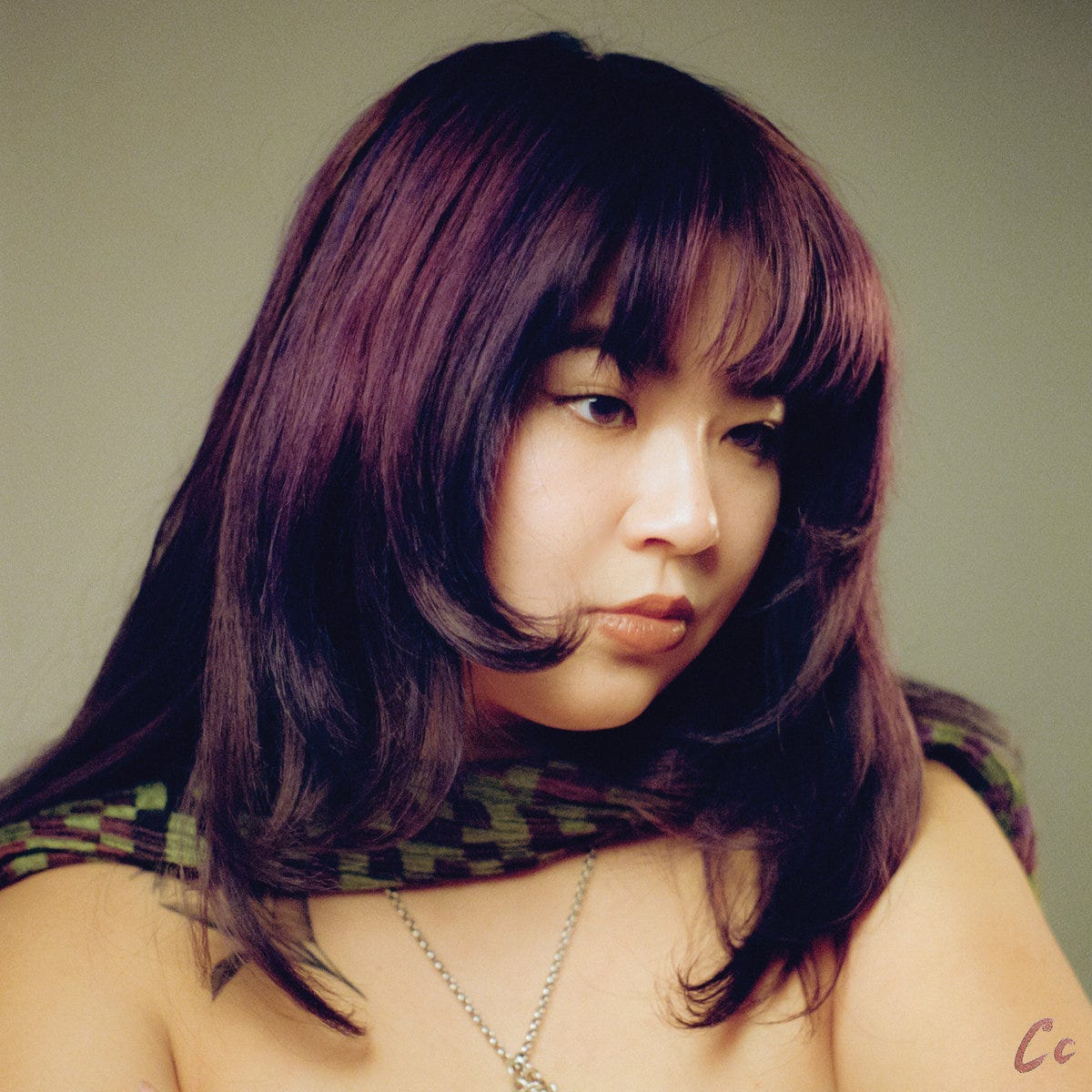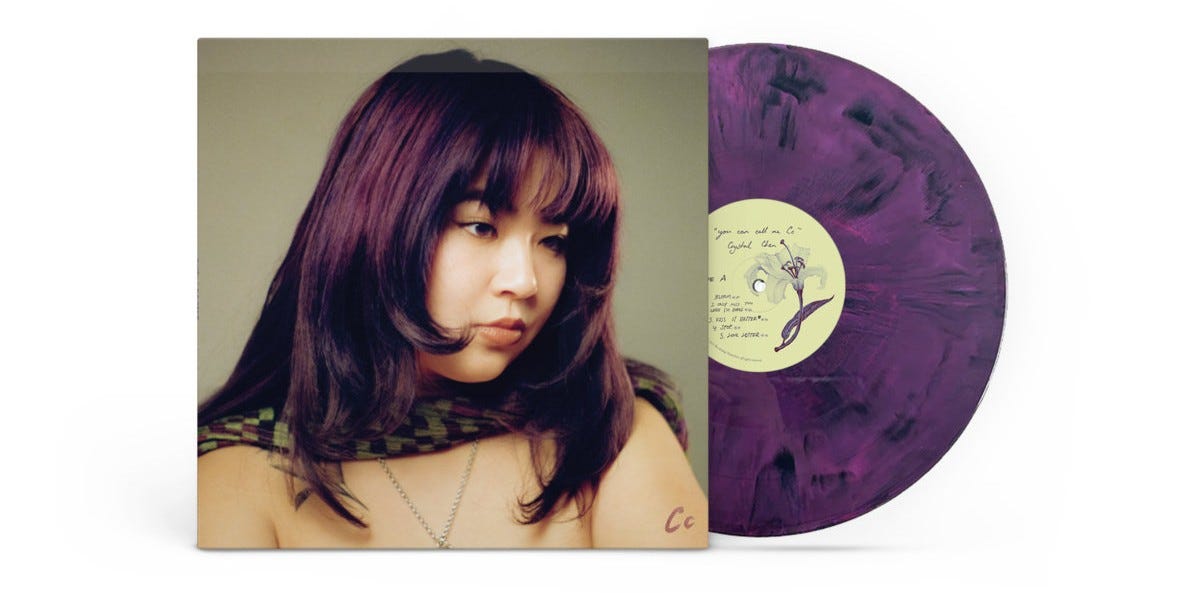Crystal Chen, You Can Call Me CC
Some notes on the Tāmaki Makaurau, Aotearoa based photographer and musician's debut album.
Selected Works is a weekly (usually) newsletter by the Te Whanganui-a-Tara, Aotearoa (Wellington, New Zealand) based freelance music journalist, broadcaster, copywriter and sometimes DJ Martyn Pepperell, aka Yours Truly. Most weeks, Selected Works consists of a recap of what I’ve been doing lately and some of what I’ve been listening to and reading, paired with film photographs I’ve taken + some bonuses. All of that said, sometimes, it takes completely different forms.
Analogue film photography and extravagant late 1970s/early 1980s lounge music are the intertwined energies that underscore Chinese New Zealand artist Crystal Chen’s multidisciplinary output. These qualities shape the bossa nova, jazz-funk, boogie, soul and city pop-informed sensibilities of her debut album, You Can Call Me CC.
Born and raised in Tāmaki Makaurau, Aotearoa (Auckland, New Zealand), Crystal was nourished by music, fashion and photography from an early age. “My life inspires my art, and my art inspires my life,” she says. “Sometimes I feel like my reality is also a fantasy, but I just live in it.” As You Can Call Me CC opens with the delicate harp flourishes, woodwind swirls, and jazzy shuffle of ‘Bloom’, Crystal welcomes us into the rose-tinted magic art as a retreat from life, and life as an inspiration for art. This vivid yet dreamy (hyperreal?) interzone continues to unfold across the pastoral melodies and balladic aesthetic of ‘I Only Miss You When I'm Bored’ and the candlelit neo soul samba swing of ‘Kiss It Better’.
After finishing high school, Crystal studied communications for a year at university. Outside of the classroom, she participated in songwriting sessions at a local studio, worked in retail and an analogue film store, and shot numerous fashion photoshoots. The experience was hectic, but it galvanised her resolve to use music and the visual arts to find a way forward. Soon enough, she was providing visual services to a mixture of well-known musicians and established fashion houses and lifestyle brands.
In tandem with this period of creative growth, Crystal began finding her way in the world on social, personal and romantic levels, becoming, as she put it to me once, “A young woman growing up in the world.” Across You Can Call Me CC, she paints sonic portraits of connection and familiarity on tracks like ‘Stop’, ‘Lasange’ and ‘Love Letter’, evoking images of the madness of irresistible attraction, a lover cooking her one of the great Italian comfort foods, and the intimacy of a handwritten letter to (or from) your special someone.
‘Love Letter’, produced by fellow Tāmaki Makaurau musician Kenny Sterling, represents a crucial turning point here. Released at the start of 2024 and later accompanied by a stunning Shanghai lounge-style music video, the R&B/boogie slanted single signalled the focus of a refined clarity of vision on Crystal’s part. From there, she successfully mounted a Boosted crowdfunding campaign to record You Can Call Me CC at Roundhead Studios.
During those sessions, Crystal called on an extravagant cast of friends-turned-collaborators drawn from Tāmaki Makaurau’s burgeoning live music and visual arts communities. Across twelve romantic, heart-sick, fun, and firm-but-fragile songs that match her soulful voice and poetic writing with ornate band arrangements, You Can Call Me CC unfolded as a collection of stories about coming of age and finding one's way in the world, warts and all. From the horn-laced breakbeat jazz funk of ‘Top Down’, to the quiet beauty of ‘Stained Glass’ and the expansive gestures of ‘The Evening’s Affair’, the album reveals itself as a unique proposition within the annals of popular music from Aotearoa.
Over the last year, Crystal has shared the stage with Revulva and Telenova, appeared at Tāmaki Makaurau and Te Whanganui A Tara’s The Others Way and Cubadupa festivals, and hosted her own headline performance at Big Fan. Along the way, her singles and their lush music videos have been celebrated here and abroad by the national Student Radio Network, the HALO International Film Festival, and the 2024 Vision Fest Film Festival.
I’m excited to see how the audience receives You Can Call Me CC post-release on September 5th, but I’m even more excited to see how this record changes things in the future. Hopefully, in ten years’ time, we’ll be able to fully appreciate how Crystal’s work has emboldened a new generation or wave. For now, however, you can pre-order You Can Call Me CC over here in vinyl or digital formats.
SKYLAB RADIO: ISLANDS IN THE SUN
In the late 1990s and early 2000s, house music experienced a surge in popularity across Aotearoa and Te Waipounamu, the archipelago commonly known overseas as New Zealand. As nightclub audiences swelled up and down the nation, several waves of producers, including the late great Soane, Cuffy & Leon D, Subware, Del Rey System, Rockwood, and their peers, turned out an immaculate array of house records, often voiced by generational talents like Teremoana Rapley, Anthony Gold, and Sandy Mills. In a one-hour special for Skylab Radio, I look back at some of my favourite tracks from the era.
FIN.



